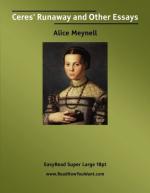To walk unbound is to walk in prose, without the friction of the wings of metre, without the sweet and encouraging tug upon the spirit and the line.
No dead weight follows you as you tow. The burden is willing; it depends upon you gaily, as a friend may do without making any depressing show of helplessness; neither, on the other hand, is it apt to set you at naught or charge you with a make-believe. It accompanies, it almost anticipates; it lags when you are brisk, just so much as to give your briskness good reason, and to justify you if you should take to still more nimble heels. All your haste, moreover, does but waken a more brilliantly-sounding ripple.
The bounding and rebounding burden you carry (but it nearly seems to carry you, so fine is the mutual good will) gives work to your figure, enlists your erectness and your gait, but leaves your eyes free. No watching of mechanisms for the labourer of the tow-path. What little outlook is to be kept falls to the lot of the steerer smoothly towed. Your easy and efficient work lets you carry your head high and watch the birds, or listen to them. They fly in such lofty air that they seem to turn blue in the blue sky. A flash of their flight shows silver for a moment, but they are blue birds in that sunny distance above, as mountains are blue, and horizons. The days are so still that you do not merely hear the cawing of the rooks—you overhear their hundred private croakings and creakings, the soliloquy of the solitary places swept by wings.
As for songs, it is September, and the silence of July is long at an end. This year’s robins are in full voice; and the only song that is not for love or nesting—the childish song of boy-birds, the freshest and youngest note—is, by a happy paradox, that of an autumnal voice.
Here is no hoot, nor hurry of engines, nor whisper of the cyclist’s wheel, nor foot upon a road, to overcome that light but resounding note. Silent are feet on the grassy brink, like the innocent, stealthy soles of the barefooted in the south.
THE TETHERED CONSTELLATIONS
It is no small thing—no light discovery—to find a river Andromeda and Arcturus and their bright neighbours wheeling for half a summer night around a pole-star in the waters. One star or two—delicate visitants of streams—we are used to see, somewhat by a sleight of the eyes, so fine and so fleeting is that apparition. Or the southern waves may show the light—not the image—of the evening or the morning planet. But this, in a pool of the country Thames at night, is no ripple-lengthened light; it is the startling image of a whole large constellation burning in the flood.




